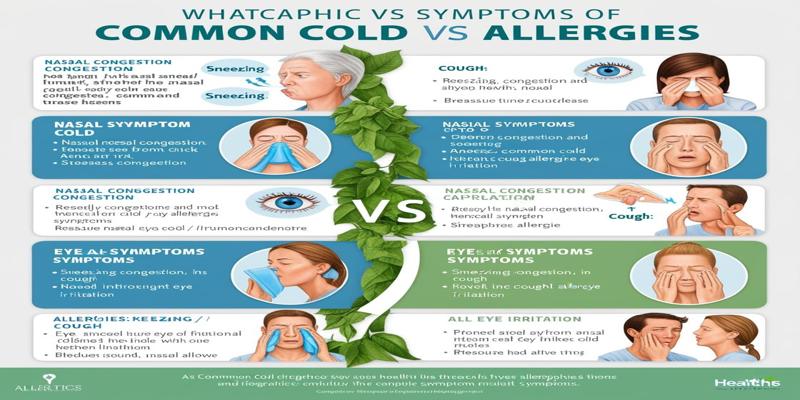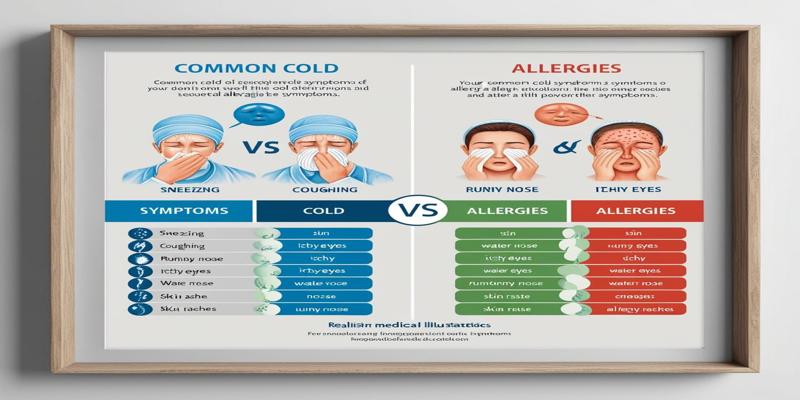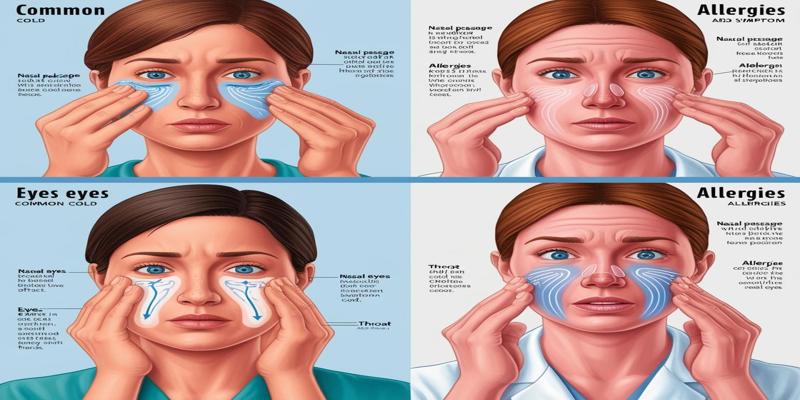Advertisement
Do you have sneezing, coughing, and symptoms that make you feel miserable? Knowing whether you have a cold or seasonal allergies can be tricky. That's because many cold and allergy symptoms are identical. Both conditions are characterized by:

You can hardly tell whether it's the common cold or an allergic reaction when you are unwell. Although the symptoms are similar in both, each has some characteristic features that identify the exact cause.
The general symptoms of the common cold usually begin with sore throat, followed by congestion of the nasal passages, runny nose, and coughing. You may even exhibit the following:
Allergies, on the other hand, often present with:
Whereas cold symptoms will ultimately fade away, allergy symptoms will continue to show up for as long as a person is around the allergen, and they never include fever or body aches.
The duration and timing of symptoms can be telling. Colds usually last 7-10 days, while allergies can linger for weeks or months. Additionally, colds are more common in winter, whereas allergies often flare up in spring and fall. Pay attention to these nuances to better understand what's affecting your health and seek appropriate treatment.
The common cold is caused mainly by viruses, the most frequent offenders being rhinoviruses. These microscopic invaders enter your body via the nose, mouth, or eyes, usually when you come in contact with contaminated surfaces or inhale droplets from an infected person's cough or sneeze. Once inside, they take over your cells to replicate, starting your immune system's response and giving you cold symptoms.
On the other hand, allergies result from an overactive immune system response to harmless things in the environment. When allergens such as pollen, dust mites, and animal dander enter your body, the immune system mistakenly thinks these are harmful. In response, histamine and other chemicals are released, causing allergy symptoms. Unlike colds, allergies are not contagious and can remain until one is still exposed to whatever is causing the allergy.
Although it is possible to have a cold at any time during the year, colds are more common in the fall and winter months, during which people are indoors together. Allergies, however, often occur according to predictable seasonal patterns depending on the allergen. For example, tree pollen allergies usually peak during spring, grass pollen in summer, and ragweed in fall. Recognizing such patterns may help you distinguish whether a cold or allergies bother you, especially when symptoms appear around your typical allergy season.

The closeness of symptoms makes distinguishing a cold from an allergy a thing of great attention. While there are several similarities between the conditions, there is a distinction in symptoms that will enable sufferers to ascertain which conditions they are suffering from clinically.
Cold symptoms are gradual in onset, developing over several days, and usually last for 7-10 days. Symptoms of allergy often begin suddenly and may last as long as you are continually exposed to the allergen.
Colds have associated symptoms, including a runny or stuffy nose, a sore throat, a cough, and sometimes a low-grade fever. Allergies symptomatically involve the respiratory system and the eyes. You are more likely to experience itchy, watery eyes, sneezing, and a runny nose with clear discharge from allergies.
While both conditions can tire you, colds are more likely to cause body aches and general fatigue. Allergies typically don't result in significant body pain or exhaustion, although they can certainly be draining over time.
While most colds and allergies can be managed at home, there are occasions when it becomes increasingly necessary to seek professional medical advice. Knowing when will help avoid complications and ensure appropriate treatment.
If they have lasted more than 10 days or worsened substantially, it is time to visit a doctor. This is particularly important in cases of high fever over 101.3F or 38.5C, severe headaches, or shortness of breath. In such instances, symptoms could indicate complications such as sinusitis or even pneumonia.
If you experience symptoms that aren't typical of either colds or allergic reactions, consult your doctor. Such signs and symptoms might include:
If you feel like you are constantly fighting what appears to be colds or allergies, you should mention this to a doctor. The real problem could be chronic sinusitis, undiagnosed allergies, or even immune system disorders that need an appropriate diagnosis and treatment.
Self-medication over-the-counter can bring considerable relief when combating colds or allergies. Colds require decongestants for nasal passages, while antihistamines are effective for allergy symptoms. Pain relievers such as acetaminophen or ibuprofen reduce fever and alleviate body aches associated with colds. Always read the labels carefully and follow the dosage instructions.
These can be complemented with natural remedies and lifestyle changes. In both conditions, hydration is very important because it liquefies mucus and soothes an irritated throat. A humidifier adds moisture to the air, which helps to alleviate congestion and irritated airways. In the case of allergies, air purifiers and regular cleaning of your space will reduce your contact with allergens.
While most colds and allergies can be managed at home, there are instances where medical attention is necessary. Symptoms that last more than 10 days, suddenly worsen, or are accompanied by high fever, severe pain, or difficulty breathing are indications to consult a healthcare provider. The allergist can help determine chronic allergies and develop a long-term management plan, including possible immunotherapy such as allergy shots or sublingual tablets.
It is, therefore, quite tricky to differentiate between the common cold and allergies. Still, it's critical to comprehend differences in symptoms, duration, and triggers for the right treatment. By paying close attention to your symptoms and when they show up, you can better tell if you're battling off a viral infection or taking part in an allergic reaction.
Advertisement

By Darnell Malan/Mar 17, 2025

By Sean William/Jan 11, 2025

By Georgia Vincent/Mar 17, 2025

By Juliana Daniel/Jan 05, 2025

By Celia Kreitner/Jan 23, 2025

By Kristina Cappetta/Mar 18, 2025

By Madison Evans/Jan 20, 2025

By Darnell Malan/Feb 28, 2025

By Susan Kelly/Feb 28, 2025

By Alison Perry/Jan 20, 2025

By Maurice Oliver/Nov 06, 2024

By Pamela Andrew/Mar 17, 2025